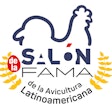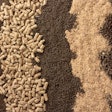
Those who criticize poultry production as we know it, in terms of animal welfare, always apply human sensations and mental states to hens and chickens. Of course, who would like to live in a jail? Let’s take the hens out of their prison cages! Let them free to run and play on the ground (and get sunburn, diseases, parasites, cannibalized by flock mates and so on).
Although I must agree that certain changes in production can be done to improve poultry lives and production – that do not necessarily mean changing the whole system – there are many other aspects that advocates do not know impact animal welfare. I mean, it doesn't even occur to them.
As I said in my last blog post, I attended the wonderful ANECA convention last week, in Veracruz, Mexico. Among the many people I talked to, I had the opportunity to interview Megan Bible, an amazing scientist from Hamlet Protein. Dr. Bible gave a presentation on protein kinetics as a new tool for feed formulation.
Their research is looking at defining how proteins and amino acids – blood meal and high crude protein soybean meal – are digested, absorbed and how they enter the bloodstream. They are synchronizing amino acids that are coming in with other proteins and see which amino acids can be better utilized by the animal. The bird gets the most protein they need in the first 10 days, helping the gastrointestinal tract to become healthier as well. So, even with a similar feed intake, more protein will be deposited as muscle or other goals in the animal. Therefore, feed production is improved; nitrogen utilization is improved, which means you have less nitrogen that's being excreted – a better environment in the end.
After hearing that wonderful explanation, I had nothing to do but reflect on what all this means for the bird, in addition to improving efficiency and having a positive economic impact. If the bird is being fed well, the bird must digest better and feel better. Isn’t this also animal welfare? Plus, it will contaminate less. Isn’t this sustainability?
I am originally a poultry nutritionist, although I no longer work in that marvelous field. I have to say how I have always admired the advances in knowledge of animal nutrition. Many do not even believe that human nutrition is based on animal nutrition. And many do not know this is animal welfare too.
What do you think?


















